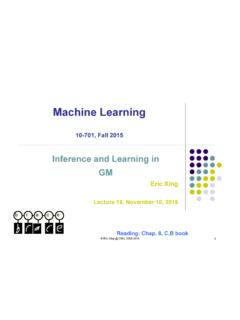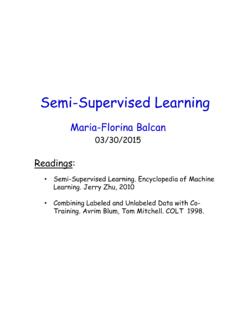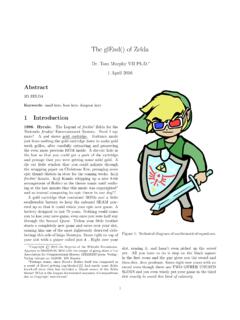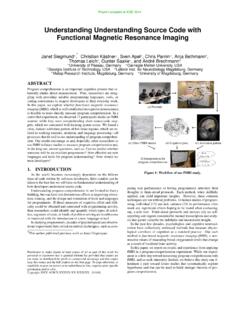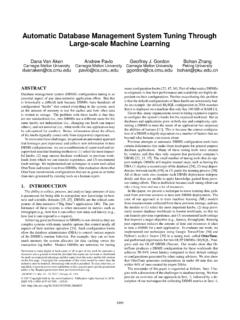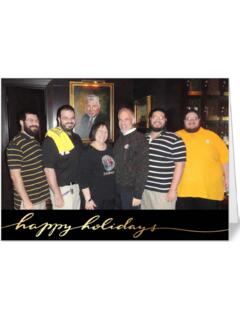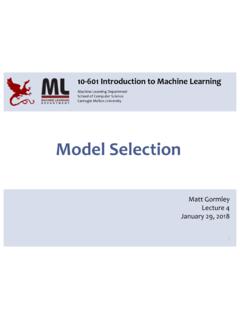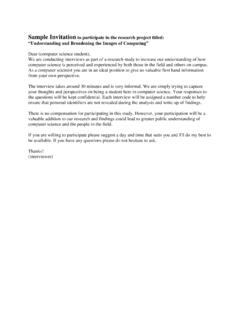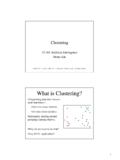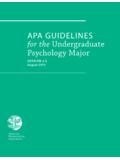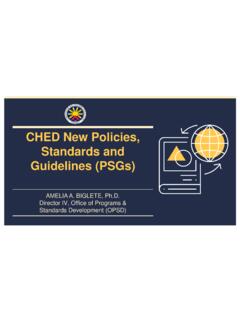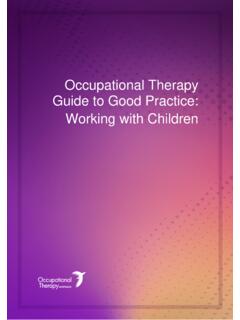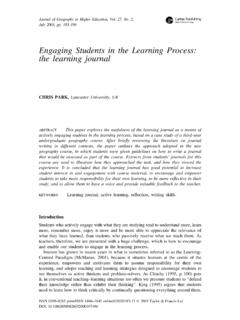Transcription of Applying to Ph.D. Programs in Computer Science
1 Applying to Programs in Computer Science Mor Harchol-Balter Computer Science Department Carnegie Mellon University Last updated 2014. 1 Introduction This document is intended for people Applying to Programs in Computer Science or related areas. The document is informal in nature and is meant to express only the opinions of the author. The author is a professor of Computer Science at CMU, and has been involved in the admissions process at CMU, Berkeley, and MIT. Please direct any further questions you have after reading this document to our Admissions Coordinator Do not send email to the author of this document.
2 Contents 1 Introduction 1. 2 Do I really want a What does a entail? 2. What is a .. 2. Lack of emphasis on courses .. 2. The research process and advisor/advisee relationships .. 3. Frustrations and joys of research .. 5. Funding during the .. 6. Life after the .. 7. Should I get a .. 7. 1. 3 The Application Process 8. Transcript grades and classes .. 9. GRE scores and TOEFL .. 10. Personal statement .. 11. Previous Research Experience .. 12. Recommendations .. 14. Whom to ask for a letter .. 15. How to ask for a letter .. 16. Awards and Extracurriculars.
3 17. How many schools should you apply to? .. 17. 4 Fellowship Information 18. Why you need to apply .. 18. List of fellowships .. 18. 5 Choosing the right program for you 19. 6 Current 2014 Rankings of CS Programs in the 21. 2 Do I really want a What does a entail? What is a A is a long, in depth research exploration of one topic. By long we're typi- cally talking about 6 years. By in depth we mean that at the end of the you will be the world expert or close to it in your particular area. You will know more than your advisor about your particular research area.
4 You will know about your research than anyone at your school. By one we mean that by the last couple years of your , you will typically be working on only one narrow problem. The is not about breadth, it is about depth. Lack of emphasis on courses The and degrees are about breadth not depth. The main requirement in the and degrees is often a large numbers of courses. A or in 2. CS often entails taking 3 or 4 classes each semester. In contrast, a program typically requires typically less than 10 courses during the entire 6 years (at CMU there are 5 required core courses, and 3 re- quired electives ).
5 The emphasis in the is not on classes, but rather on research. A student will typically take classes only when she feels that they will be useful in her research. The classes she takes may not even be in CS at all. They may be in Statistics, Operations Research, Math, psychology , Linguistics, or anything else useful for her particular research topic. The research process and advisor/advisee relationships As stated earlier, the main focus of a is research. You typically begin your research at the time when you select an advisor. At most schools you pick an advisor sometime after your first year.
6 At CMU, we like you to start research right away, so you pick an advisor within a month or two of starting the program. Research is very different from taking classes. Many students never make the transition between taking classes and doing research in fact, at most schools only 1/2 of the students who enter the program leave with a (at CMU, about 3/4 end up with a ). Keep in mind that we're typically talking about students who came in with GPA's from a top undergraduate program. Some key differences between classes and research: In classes, the homework problems all have known answers and the tech- niques needed for solving the problems have (usually) been introduced in class.
7 In research, you may be working on a problem for years without a clue of whether it is solvable. You will be the one inventing or finding the techniques for solving the problem. In classes, you are assigned certain problems to work on. In research, you get to pick the problems. In fact it is your job to find good problems. By good we mean problems which are fundamental. For example, finding a system hack which makes a particular product like Cisco's Local Director run better is something that Cisco would love, but would not count as fun- damental research.
8 However discovering better algorithms for the problem of task assignment of jobs to hosts in a server farm is considered fundamen- tal research. You are also responsible for making sure that no one else has already solved this problem. This typically involves reading hundreds of papers on earlier research in this area. In classes, if you can't solve your homework problem, you can always ask other classmates. Even if none of your classmates know, you can ask the professor, who certainly knows the answer. In research, you are often work- ing alone, or at best with you advisor and maybe one other student.
9 You are 3. free to ask anyone in the world for help, but they will typically not be able to help you, since they don't know the answer either if they did, it wouldn't be research. Many students have a hard time with working independently. In classes, you are constantly being given grades and you are constantly being told what to do next. In research, there are no grades. There is some instruction (from your advisor), but mostly it's up to you to be self-motivated and pro-active. In the classroom, there is a distance between you and your professor.
10 In re- search, you and your advisor will work side-by-side. Your advisor will still tell you what to do give you ideas for problems to work on, assign papers for you to read, give you programming assignments, and often give you a time-line and schedule. However, when you and your advisor are working on a problem together, you will work as equals. You will both learn from each other. You will make discoveries together. Many students are surprised to find that their advisor is very different in research than in the classroom. A. professor who is very dry in the classroom and often looks bored and uncom- fortable will often become extremely enthusiastic and excited when working on research problems.
